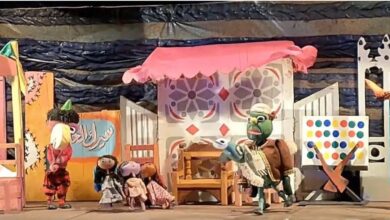Ramadan is a time of fasting, self-restraint and good deeds. It is also an occasion for storytelling, either in celebration of the nightly feasts or as a way to pass the time between. In the spirit of the long days and longer nights of Ramadan, Al-Masry Al-Youm shares stories and tips for a good month in a new series called “Alf Leila We Leila: Stories for Ramadan Through the Ages.” Throughout the holy month, we will post original pieces from the Al-Masry Al-Youm staff on everything from how to host a perfect iftar to the five senses of the season, alongside Arabic literature from Scheherazade to Mahfouz.
Below, reporter Ahmed Ramadan–who recently advised exercise lovers among youon how to break out of a fitness plateau and wrote about the street of the tentmakers–recalls two stories of his Ramadan past.
For someone born to a Muslim Syrian father and Christian Lebanese mother, Ramadan was always quite an experience on both sides of the family. It is interesting how the month of Ramadan plays a role in creating two unforgettable memories of mine about the two extremely different sides of my family, and that these memories stand the challenges of time and forgetfulness.
Damascus:
I remember a Ramadan night when I spent the evening at my grandmother’s house. The seven-, maybe eight-, year-old me was trying to be helpful by spreading the plates on the table while my grandfather, who happened to distrust TV iftar announcements, was listening for the deeper, static voice of the Omayyad mosque muezzen on the official Damascus radio station who always calls the sunset prayer two minutes too late.
While it seemed to me and my two cousins that we stayed up very late that night, we must have slipped into dreamland long before midnight. At 3AM we were awakened by a loud knocking from the street.
“Al-Mesaheer,” my grandmother said, opening the door to our small room. “Who wants to see al-Mesaheer?!”
Al-Mesaheer, known as Mesaharaty in Egypt, is only seen in the month of Ramadan. He holds his little drum, knocking on it rhythmically five times in front of each house in his neighborhood in order to wake people up foral-sohour, the famous pre-fasting meal.
“Qumo ala sohour-kon, khalli Ramadan yezor-kon,” he sings, asking people to wake up for their sohour, allowing the month of Ramadan to visit their homes. Then he starts calling the man of each house by the name of his eldest son. “Abu-Ahmed (Father of Ahmed), wake up for your sohour; Abu-Khaled, you wake up, too.”
Three tiny faces gathered in the window overlooking the main street next to my grandfather’s old Damascus house. For a second, all we saw was a bright light coming from afar and blocking our view, then suddenly, we noticed the son of al-Mesaheer walking sleepily, holding a small lamp responsible for the bright light. Behind the child was the silhouette of his father in his big fez, darkened by the light in front of him, his small drum and his sherwall (traditional shami black pants that were the inspiration behind rapper M.C. Hammer's famous pants). He was walking slowly, looking left and right, and calling people to wake up.
“Ya nayeem waheed El-Dayeem, ya nayeem waheed Rabak,” he said with a hint of adoration, as he called sleeping people to wake up and pray to God, who never sleeps.
He walked by us, ignoring us, calling out for more people to wake up before the light of his son’s lamp dims.
The sky, on the other hand, was getting bluer by the second.
Beirut:
I can’t really tell you what it felt like. All that snow on the road, all the frost on the car windows, and the warmth of the wool gloves my mother made me.
My uncle lives in Beirut, almost an hour and half away from Baalbek, my mother’s tiny home city in Lebanon’s Bekaa valley. We were heading there early one Sunday morning, trying to avoid the Beirut traffic.
The somewhat sulky teenaged me was sitting in the backseat watching the road silently, while my mother held her breath whenever my uncle took a dangerous turn or got a little close to the edge of the road overlooking the valley.
“So, you are fasting this year?” my uncle asked, looking at me in the front mirror. My mother tightened her hand on his, asking him to shut up. I did not answer my uncle’s question and kept my thoughts to myself. I was indeed fasting that year, but for some odd reason, I wanted to keep that information to myself.
The snow began disappearing slowly as we got closer to Lebanon’s seaside. The clouds, however, were still present and the rain did not stop.
Although I had visited Beirut before, this is my first concrete memory of the city: a rainy Ramadan day with cold dark skies painted with spots of light escaping the clouds. I knew that it would be lunch time when we arrived at my uncle’s house, so I asked my mother if she minded dropping me on the sea ridge.
“But it’s raining,” my mother said in a horrified voice. “And you don’t know the way to your uncle’s house.” I calmly convinced her that I could handle some rain and would be able to find my uncle’s house easily. I gathered my CD player and my coat, and was out of the car before she could argue with me anymore.
I remember walking for hours in the rain, listening to a CD of the last year’s hits over and over. I still remember the tracklist: Santana’s “Smooth,” N’Sync’s “It’s Gonna Be Me,” Madonna’s “Music,” Ricky Martin’s “Livin’ La Vida Loca,” and Will Smith’s “Wild Wild West.” The rain became harsher as the evening arrived and people started to disappear from the streets around me. Suddenly, the call to prayer came from a nearby mosque. It was time for iftar.
With my music in the background, I started running aimlessly. I couldn’t tell where exactly I was going, but I was heading toward the spot where my mother dropped me hours ago. I couldn’t see the streets anymore. I wasn’t sure if that was because I was crying or because of the rain. I fell in the mud.
“Are you going somewhere?” a taxi driver asked me. He had a huge tattoo of a saint on his left shoulder. “I need to go to Rue Spears, please,” I said. “I want to catch the iftar.”
When I arrived at the house, two hours late for iftar, my mother brought me a hot meal and some dry clothes, and sat next to me, watching me eat quietly.




